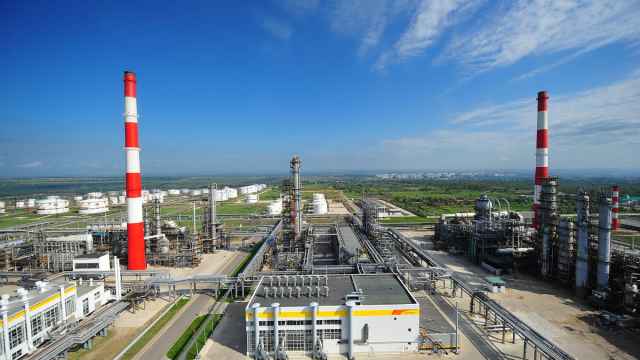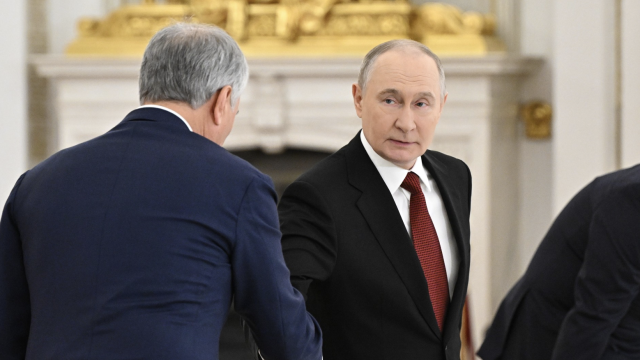SOCHI — Foreign investors on Friday lauded Russia's stability and openness at an economic forum headlined by Prime Minister Vladimir Putin, who oversaw the signing of deals to attract $800 million of investment from the United Arab Emirates.
Officials and executives gathered in the Black Sea resort of Sochi for the fourth annual Sochi International Investment Forum in hopes of drawing new cash to the region and halting a slide in foreign direct investment.
The meeting is also Russia's second attempt this month to bolster its international profile, following a political forum in Yaroslavl hosted by President Dmitry Medvedev.
The investment arm of Russian Technologies, a state-run industrial conglomerate, signed agreements Friday with two companies from the United Arab Emirates: the ports and logistics unit of Crescent Group and real estate developer Damac.
Prominvest, a Russian Technologies subsidiary, and Gulftainer, a Crescent Group unit, agreed to set up a $500 million fund to acquire ports and logistics assets in Russia and in other former Soviet states.
"This is another major demonstration by the Crescent Group of its commitment to building strong economic ties with our Russian brothers," vice chairman Badr Jafar said in a statement.
Crescent Group has other business with Russia. Its energy arm, Crescent Petroleum, and state-run oil producer Rosneft jointly began developing an oil and gas field in the United Arab Emirates in June.
Under the other agreement signed Friday, luxury developer Damac will invest $300 million in a joint real estate fund, whose projects will include facilities for the 2014 Winter Olympic Games in Sochi.
Hussain Sajwani, chairman of Damac Properties, said in a statement that his company had a "strong capital position" and was entering a market that features a "strong regulatory and transparency framework."
The praise came as Putin pledged to streamline obstacles to construction, which officials are regularly accused of using to draw bribes.
The Cabinet will issue a decree standardizing the contract for businesses to connect to electricity supplies to prevent arm-twisting by suppliers, Putin told the forum in his opening speech.
The government also decided that state agencies would eventually stop issuing compliance certificates for products and services, handing over the often business-unfriendly process to specially accredited private laboratories and experts, Putin said.
Assembled in the Winter Theater building on a hill above the Black Sea, forum guests were unable to see any of the major projects around the city, which has become Russia's largest construction site ahead of the Olympics.
But guests arriving by air were able to see the new Sochi airport, which Oleg Deripaska's Basic Element officially opened a day before the forum. Even a short tour around Sochi revealed work to build huge bridges, tunnels and overpasses — efforts that largely began after last year's forum.
Speaking at the forum, Jafar said the Gulftainer investment owed to Russia's lack of major political turbulence.
"Political stability in the country I think has been a major attraction for Middle Eastern countries," he said.
He also stressed that 80 percent of Russian exports leave through ports, and 50 percent of that is from just four of Russia's 41 ports, meaning that the others have a long way to go in developing. Great potential also lies in the handling of inland container traffic that is need of depots and logistics centers, he said.
Last week, state-run Transneft and a partner announced plans to acquire the Novorossiisk oil port. If approved, the deal would give the investors — who also own the Baltic port of Primorsk — control of most oil loaded for export in European Russia.
Putin said creation of the fund showed how Russia is friendlier to Arab investment than the United States.
He appeared to be referring to Dubai Ports World's aborted attempt in 2006 to purchase a firm that manages six of the largest ports in the United States, including in New York, Miami and New Orleans. The deal was scrapped amid heavy political pressure in the United States.
"Incidentally, unlike other countries, say, the United States, we don't place any restrictions on attracting foreign capital in ports infrastructure," Putin said in response to comments at the forum. "We don't say we won't allow Arab capital there. Go ahead, please!"
The government does have restrictions on foreign investments in the many sectors and companies that it considers strategic. Companies seeking to acquire significant stakes in such companies must receive approval from a government commission chaired by Putin.
Foreign direct investment declined an annual 11 percent in the first half to $5.4 billion, the State Statistics Service said last month. The continued decline came after FDI slid 41 percent last year to $15.9 billion, although it was an improvement over the 18 percent drop in the first quarter.
Also at the forum, French builder Vinci made its first comment on the delayed construction of a politically contentious road from Moscow to St. Petersburg through the Khimki forest.
Yves-Thibault de Silguy, deputy chairman of Vinci, said the company considered it "normal" that the government wanted more studies of the environmental impact after a public outcry.
"We go along with the government in additional consultations with stakeholders," he said. "For us, Russia is a good opportunity."
Medvedev ordered a halt to work on the road for additional public discussion on alternate routes. Putin, who has backed the route through the forest, replied that he was "grateful" for the company's understanding.
"I hope we will, with our French partners, implement both this and other projects," he said. "It is the first transportation concession project. We, of course, would like it to be successful. But I'm sure it's not the last one."
During a panel discussion moderated by Morgan Stanley chairman Rair Simonyan, Putin quipped about too much democracy after being asked to wait before jumping into the conversation.
Simonyan had noted the important role that the energy exports play in Russia and went on to list predictions for oil prices.
"May I not give you the floor, Vladimir Vladimirovich? The thing is …" he said before Putin sarcastically retorted, "Democracy! They invite me but don't give me the floor!"
It turned out Simonyan wanted Royal Dutch Shell chief Peter Vosner to speak first. Vosner, summing up his speech, joked that oil would fluctuate in a range "greater than zero but below a hundred" dollars per barrel, prompting loud laughter from the audience.
Putin later addressed his country's heavy dependence on energy, saying the country planned to reduce oil and gas revenues in the near term. He did not elaborate, but oil companies have pushed for lower taxes to enable investment in new, difficult fields.
In his opening speech, Putin also said visa restrictions were holding back human and business contacts between Russia and the European Union. He mentioned a new Russian rule for employing high-paid foreigners that was enacted earlier this year, immediately allowing them three-year visas, and the country's low 13 percent income tax.
"The next step … is removing the visa regime for travel between Russia and the European Union," Putin said. "Russia is ready to move very quickly on its way toward abolishing visas. The matter depends on the political will of our European partners."
A Message from The Moscow Times:
Dear readers,
We are facing unprecedented challenges. Russia's Prosecutor General's Office has designated The Moscow Times as an "undesirable" organization, criminalizing our work and putting our staff at risk of prosecution. This follows our earlier unjust labeling as a "foreign agent."
These actions are direct attempts to silence independent journalism in Russia. The authorities claim our work "discredits the decisions of the Russian leadership." We see things differently: we strive to provide accurate, unbiased reporting on Russia.
We, the journalists of The Moscow Times, refuse to be silenced. But to continue our work, we need your help.
Your support, no matter how small, makes a world of difference. If you can, please support us monthly starting from just $2. It's quick to set up, and every contribution makes a significant impact.
By supporting The Moscow Times, you're defending open, independent journalism in the face of repression. Thank you for standing with us.
Remind me later.





